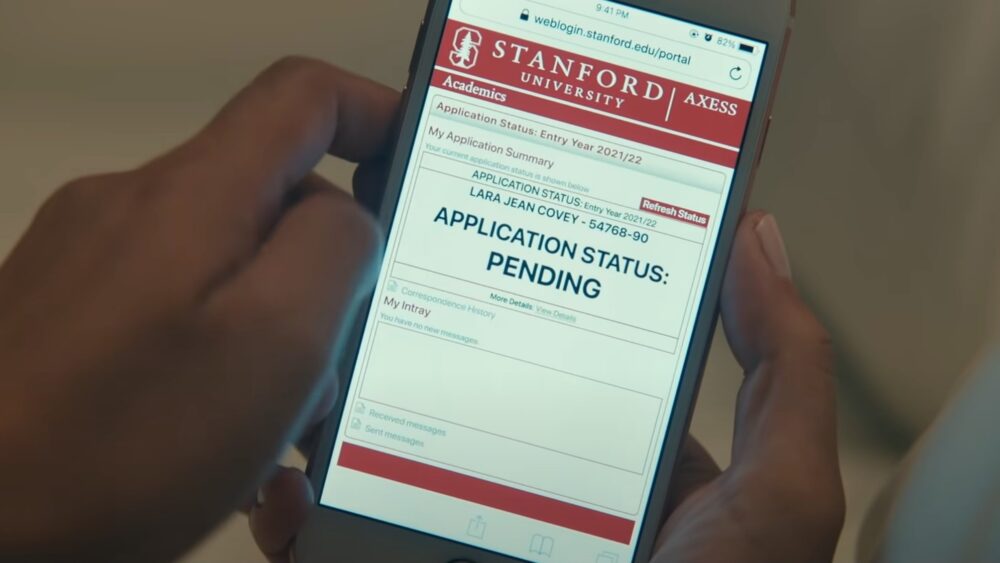
By Jenny Tran
The life of a teenager is continuously stressful. This is especially true when college application deadlines are looming over you—a constant reminder of that minuscule timeframe to figure out what to do with your life. As you load up on extracurriculars and classes and try strenuously to keep that GPA up while also weighing every option imaginable, you have the sinking suspicion that getting into college really isn’t that simple.
In fact, it’s pretty much the complete opposite. But, many TV shows and movies that are modeled toward these same teenagers seem to completely disregard that.
How many times have you heard big university names like “Harvard” and “Stanford” get casually thrown around on your TV screen? And, how many times have you watched characters effortlessly get into these universities?
Many movies and shows have characters who merely write an essay and do an interview or two for their application process. And, it seems like just like that—they get into one of the top colleges in the country.
One example is shown in the movie “The Kissing Booth,” where the main character, Elle Evans, and her boyfriend, Noah Flynn, get into incredibly competitive schools, among these being Harvard and University of California (UC), Berkeley. Neither character is shown being considerably involved in academics, extracurriculars or the many aspects involved in applying to such colleges. Noah, in fact, is even shown multiple times getting into school fights and breaking a number of school rules.
In the end of “Kissing Booth 2,” Elle gets into Harvard by writing a “heart-warming” essay that just barely scratches the surface of her given prompt. The movie implies that the mere greatness of it seems to have given her a one-way ticket to the school.
Another character who goes through an unrealistic admissions process is Betty Cooper from the show “Riverdale.” Throughout the show, Betty is only occasionally shown focused on her schoolwork. Although she is mostly too preoccupied running from cult leaders and serial killers to do her calculus homework, she still gets into Yale in the end. She manages to land a spot in this famed school after participating in a game show and her boyfriend faking his death.
Many TV shows and movies portray the college admissions process very inaccurately, which can be immensely harmful to the impressionable young audiences they have.
Characters are almost never shown considering deadlines, working out financial aid, obtaining recommendation letters, studying meticulously for the SATs and ACTs or even applying to safety schools. They rarely ever display the anxious, dark moments that come with applying to college.
They also constantly show the characters getting into very high-ranked and prominent schools, which can promote feelings of frustration in viewers who actually want to get into them. It only perpetuates the ever-growing pressure to get into such schools.
There is an obvious lack of characters being admitted into smaller, lesser-known schools; this poor representation can hit students the hardest. Many students, specifically ones at financial or local disadvantages, are simply unable to even consider going to these big-name colleges. The media having characters solely mention and attend top colleges maintains that a “noteworthy college experience” only applies to such schools. Going to a smaller college doesn’t necessarily make someone’s college experience worse, nor does it mean that that person is worse than someone who attends a university like Harvard.
People argue that teen shows and movies will never be completely accurate, especially because they are meant to be entertainment and have to consider certain enjoyment factors. The college admissions process is, unfortunately, one casualty of that. Of course, while entertainment is a priority in that sense, the impressions left on the teens watching these shows and movies are a noteworthy byproduct of that.
If this portrayal continues to be this inaccurate, teens will continue to have skewed perspectives of what applying to college is like. This can affect them in many areas, such as being unprepared or aiming too ambitiously without a backup plan.
While entertainment should still be taken into consideration, accuracy and representation should also be improved.
In “To All the Boys: Always and Forever,” the third movie of the “To All of Boys” trilogy, Peter Kavinsky and Lara Jean Covey make it into Stanford and UC Berkeley, respectively. This is a pretty drastic change from the book it is based on, which portrays the characters applying to smaller, more local schools and being completely content with them. Lara Jean is even shown applying to safety schools and the plot emphasizes how important considering different options is.
It goes to show how far the media goes to oversimplify the college admissions process just to attach big-name colleges to their characters. The differences between the “To All the Boys” books and movies make it apparent that movies are even willing to rewrite the original story to do so.
Simply having characters go to more obscure schools or genuinely putting in the effort when applying to prestigious colleges can make teens feel less isolated and perceive the application process more accurately. The “To All the Boys” books are more realistic in this sense, and, compared to the movie, it is a much more reasonable depiction of what applying to college is like. In the long run, small changes like these can make a big difference for many.





